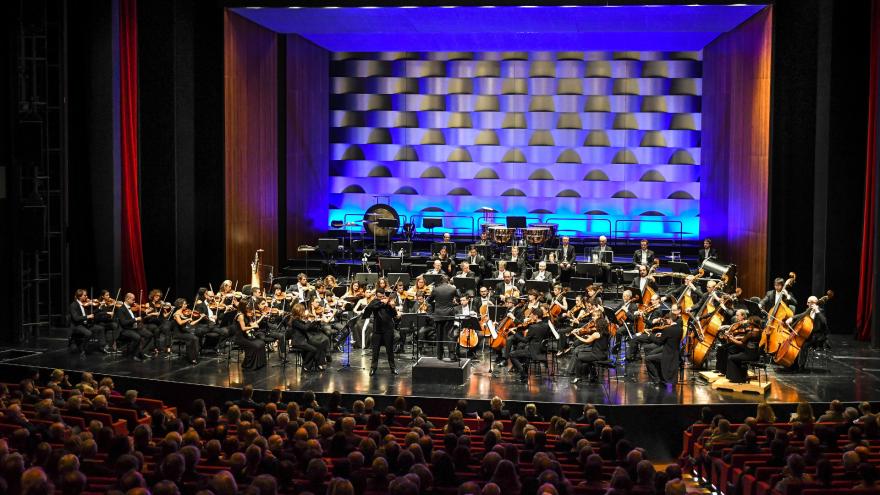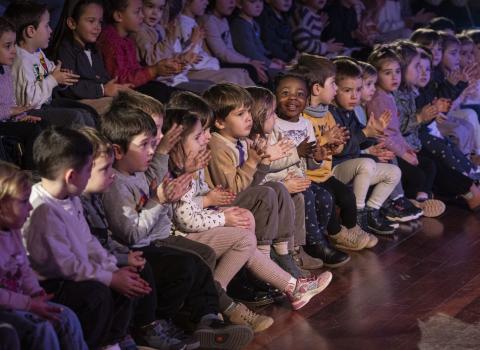The end of an exciting tour through Central Europe, with long rounds of applause in Bregenz

Robert Treviño: “I’m very proud of the orchestra and of this tour. We’ve given high quality performances which show that we’re in a very important place artistically.”
After their appearance in Munich’s Herkulessaal, the Basque National Orchestra returned to Austria for a performance on the shores of Lake Constance, in Bregenz. The orchestra gave its third and final concert of its tour programme on Saturday in the Festspielhaus, a hub of cultural activity with a 1,600-seat concert hall which was barely big enough for the Basque orchestra’s performance. The venue is particularly famous for the summer classical music festival held on the largest floating stage in Europe, with a spectacular seating stand for almost 7,000 people.
In its bid to conquer Bregenz, the orchestra played its trump card in the form of the prestigious violinist Vadim Gluzman, who joined us for the performance of Prokofiev's Violin Concerto No.2. The orchestra's debut in the city featured a strong concert programme (Sorozábal, Prokofiev and Mahler) and two heavyweight soloists: Mojca Erdmann, with us throughout the tour, and the recently mentioned Vadim Gluzman. The entire programme was led by the orchestra's lead conductor, Robert Treviño.
The concert opened once again with a Basque composer, Pablo Sorozábal. The public were taken aback by the selection of three songs from his Siete Lieder sung by the soprano Erdmann, which proved a highly appropriate way of taking to the stage on this tour. Not in vain, Sorozábal wrote this work in Leipzig in the 1920s and was a great lover of German and Central European culture. As we have said over the last few days, the presence of Sorozábal in the programme highlights the Basque National Orchestra's calling to the role of ambassador of Basque culture. It exercised this role once more by introducing the work of German poet Heinrich Heine, translated into Basque and accompanied by Sorozábal's music imbued with Basque rhythms and melodies.
Vadim Gluzman brought in to tackle Prokofiev
The Israeli violinist is world renowned for his performances which are always given under the baton of noteworthy conductors and he has been accompanied by several first-rate orchestras throughout his career. It is therefore important to highlight that Gluzman, not long after starting the Saturday morning rehearsal with our orchestra, told maestro Treviño that he had “a really good orchestra”. Not only that, “it was the best in Spain and among the best in Europe”. Gluzman attacked Prokofiev’s tricky score with a mastery, elegance and virtue that only he can bring to the concerto which premiered in Madrid in 1935. In a recent interview, Gluzman said that for him “the most important aspect of being a musician is the ability to transmit our emotions, thoughts and experiences through sound.” Gluzman reached great heights and touched hearts in the concert hall judging by the audience's response, but he held back and didn’t give an encore.
As with the rest of the tour, the second half of the programme was all about Mahler’s Fourth Symphony. Treviño gave it everything and led the orchestra in a great performance which received long rounds of applause from the public. Then came the now-familiar encores, with R. Strauss performed by Mojca Erdmann and the Intermezzo from La Boda de Luis Alonso by the Sevillian composer G. Giménez. The musicians performed for two and a half hours.
The end of an important tour through Central Europe
Two concerts in Austria (Linz and Bregenz) and one in the emblematic Herkulessaal in Munich, all in venues with a long musical tradition. Throughout, the orchestra has combined Basque music (Aita Donostia and Sorozábal) with a more universal repertoire (Elgar, Prokofiev and Mahler), all of them difficult and risky pieces. Following the tour and all the work involved beforehand, both the Managing Director, Oriol Roch, and the Lead Conductor, Robert Treviño, addressed the full ensemble during morning rehearsal. “Congratulations to the entire orchestra for all of your work. We’re very proud of the orchestra’s standard. We’ve given high quality performances which show that we’re in a very important place artistically.” Oriol Roch announced that he is already working on forthcoming tours.
Concerts & Tickets February













